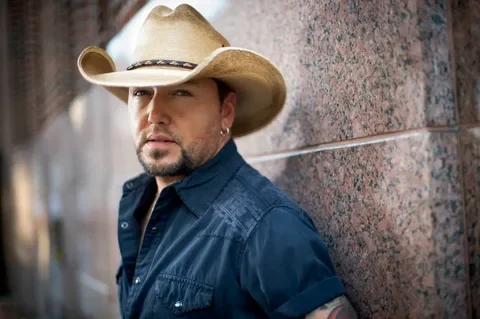Jason Aldean, a prominent figure in country music, has recently stirred significant debate with his song “Try That in a Small Town.” This track, which merges traditional country sounds with bold political commentary, has sparked widespread controversy. The song’s lyrics and visuals have triggered:
- Political Controversy: Accusations of promoting divisive political ideologies.
- Social Media Backlash: Heated discussions and reactions across various platforms.
- Cultural Impact: Reflections on the intersection of music and politics in contemporary society.
In this article, we will delve into the multifaceted controversy surrounding Aldean’s song. We’ll explore its origins, the reactions it provoked, and the broader implications for country music and political discourse.
Background of Jason Aldean and ‘Try That in a Small Town’
Jason Aldean, a well-known name in country music, has been shaping the genre with his distinctive style for years. His song “Try That in a Small Town” has recently brought him back into the spotlight, but not without controversy.
Jason Aldean’s Career:
Jason Aldean has been a prominent figure in country music since his debut. He is known for his blend of traditional country and modern rock influences, which has earned him a large and dedicated fan base. Aldean’s career has been marked by numerous hits and awards, establishing him as a leading artist in the genre.
About the Song:
“Try That in a Small Town” features lyrics that reflect Aldean’s views on societal issues and local values. The song’s themes resonate with many listeners who appreciate its portrayal of small-town life and values. However, some of the song’s lyrics and imagery have led to accusations of promoting controversial political ideas.
Initial Reception:
When “Try That in a Small Town” was first released, it quickly attracted attention. Fans praised the song for its catchy tune and relatable lyrics, while critics began to debate its political undertones. The song’s performance on the charts and its reception by the media set the stage for the ensuing controversy.
The Political and Social Controversy
The release of “Try That in a Small Town” ignited a significant political and social controversy. The song’s lyrics and its music video have been at the center of debates about its message and the political implications.
Trigger Points:
Key lyrics in “Try That in a Small Town” address themes of defiance and traditional values. The imagery in the music video, which includes scenes of protests and clashes, has been interpreted by some as a critique of current social and political issues. These elements have led to accusations that Aldean is promoting a specific political agenda.
Political Allegations:
Critics have argued that the song aligns with certain political ideologies, suggesting that it supports conservative viewpoints or reflects a disdain for progressive movements. This has led to a polarized response, with some accusing Aldean of using his platform to push a political narrative.
Social Media Backlash:
Social media platforms have played a significant role in amplifying the controversy. Discussions and debates about the song’s message have spread rapidly, with various voices weighing in on both sides. Influencers and commentators have used their platforms to express their opinions, further fueling the debate.
Perspectives from Different Sides
The controversy surrounding “Try That in a Small Town” has elicited a range of perspectives. Supporters and critics alike have voiced their opinions, reflecting the song’s impact on public discourse.
Supporters’ Viewpoint:
Many fans and supporters argue that the song is a straightforward expression of small-town pride and traditional values. They view Aldean’s lyrics as a celebration of rural life and see the controversy as an overreaction. For these supporters, the song represents a legitimate artistic expression of their beliefs.
Critics’ Viewpoint:
On the other hand, critics have expressed concern that the song promotes divisive rhetoric. They argue that the song’s lyrics and imagery contribute to a narrative that is harmful or exclusionary. For these critics, the song’s message is seen as problematic and reflective of broader societal tensions.
Middle Ground Perspectives:
Some people see merit in both sides of the debate. They recognize the song’s artistic value while also acknowledging the concerns raised by critics. These individuals believe that the controversy highlights important issues about the role of music in reflecting and shaping political and social attitudes.
The Role of Music in Political and Social Commentary
Music has long been a medium for political and social commentary, and “Try That in a Small Town” is no exception. This section explores how music often intersects with political and cultural discussions.
Historical Context:
Throughout history, songs have been used to address political and social issues. From protest songs of the 1960s to contemporary tracks dealing with current events, music has often reflected the sentiments and struggles of its time. “Try That in a Small Town” continues this tradition by engaging with modern issues through its lyrics and themes.
Country Music and Politics:
Country music has a rich history of reflecting the values and concerns of rural America. The genre often addresses themes of patriotism, community, and traditional values. “Try That in a Small Town” fits into this tradition, but its political implications have sparked debate about the role of country music in contemporary political discourse.
The Artist’s Role:
Artists have a complex role when addressing political and social issues. While some see music as a platform for activism, others view it as a form of personal expression. The controversy surrounding Aldean’s song raises questions about how artists balance their personal views with their public personas.
The Impact on Jason Aldean’s Career and Country Music
The controversy over “Try That in a Small Town” has had notable effects on both Jason Aldean’s career and the broader country music industry.
Immediate Impact:
Following the release of the song, Aldean’s public image experienced both support and backlash. The controversy led to increased media attention and debates about his career choices. The song’s reception impacted Aldean’s relationship with fans and critics alike.
Long-term Effects:
The long-term impact of the controversy on Aldean’s career remains to be seen. The song may influence his future projects and public statements. The controversy also highlights the ongoing tension between artistic expression and political sensitivity.
Impact on Country Music:
The song’s controversy reflects broader trends within the country music genre. It raises questions about how political issues are addressed in music and the potential for similar controversies in the future. The debate around Aldean’s song may shape the direction of country music and its engagement with political themes.
Cultural and Political Implications
The controversy surrounding “Try That in a Small Town” extends beyond music, reflecting broader cultural and political issues.
Reflection of Current Divisions:
The song and its controversy mirror the current divisions in American society. It highlights how cultural products can become focal points for larger political and social debates. The response to the song reveals underlying tensions and divides within the country.
Impact on Public Discourse:
The debate over the song influences public conversations about free speech, censorship, and political correctness. It raises questions about the role of music and other forms of art in addressing or reflecting societal issues. The controversy underscores the complex relationship between artistic freedom and public reaction.
Future Outlook:
Looking ahead, the controversy may influence future cultural and political events. The song’s impact on public discourse may shape how similar issues are addressed in the future. The ongoing debate reflects the evolving nature of cultural commentary and its intersection with politics.

Nicholas Clark brings a dynamic blend of insight and enthusiasm to SpoortsUp.com. With a keen eye for detail and a passion for sports analysis, Nicholas delivers engaging and thought-provoking content. Whether it’s breaking down game strategies or highlighting athlete achievements, his articles keep readers coming back for more.











